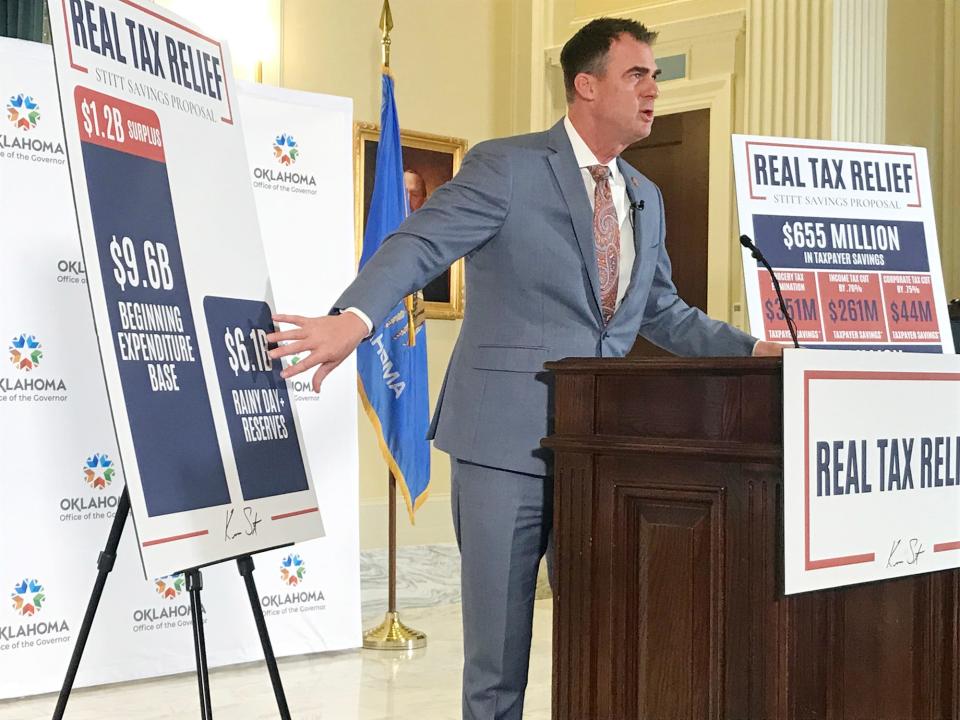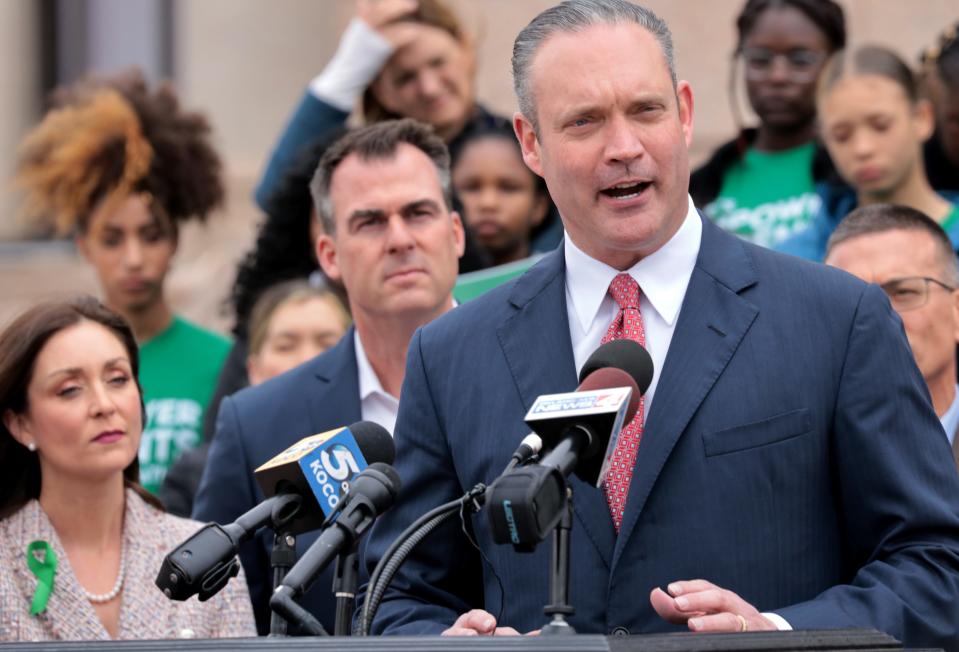Stitt vetoed 20 unrelated bills after Senate rejects his tax, education policies
- Oops!Something went wrong.Please try again later.
Gov. Kevin Stitt has vetoed 20 Senate bills as retribution for not adopting his tax cut and education plans.
The bills cover a wide range of topics, including college athletics, opioid overdose prevention, child abuse protective orders and the existence of boards that regulate architects, chiropractors and psychologists.
Stitt has pressured lawmakers this session to adopt any combination of tax cuts on groceries, personal income and corporate income. He also has urged senators to compromise on proposals to raise teacher pay and give parents a tax credit if they send their kids to private school.
On Wednesday, the House passed the governor's proposed package, but Senate Pro Tem Greg Treat responded to the move by saying: "We have already communicated to the House and governor that this isn't going to pass the Senate."
Late in the day, after meeting behind closed doors for several hours, Senate Republicans emerged with a revised version of their plans and brought them immediately to the floor. It wasn't immediately clear whether the House and the governor would support the bills.
More: Gov. Kevin Stitt vetoes OETA renewal, questioning public broadcaster's long-term value

The veto messages Stitt attached to each bill were identical:
"Oklahomans elected me to advocate on their behalf and fight for the taxpayer. I take this responsibility seriously and so I cannot, in good faith, allow another year to go by without cutting taxes and reforming education, both of which we can absolutely afford with our $1.2 billion surplus and over $6 billion in savings," Stitt wrote. "Therefore, until the people of Oklahoma have a tax cut, until every teacher in the state gets the pay raise they deserve, until parents get a tax credit to send their child to the school of their choice, I am vetoing this unrelated policy and will continue to veto any and all legislation authored by Senators who have not stood with the people of Oklahoma and supported this plan."
Both the House and Senate would have to override the bills for them to become law. A veto override requires at least a two-thirds majority for most bills. By vetoing a wide range of bills, Stitt also forces the supporters of those bills into the discussion on tax cuts and education policy.
House Speaker Charles McCall responded to Stitt's vetoes by urging the Senate to, at the very least, have a recorded vote on the bills.
More: House pressures Senate by adopting Stitt plan for teacher pay and tax credits
"We think that the Senate should put it up for a vote and just see where the chips fall," said McCall, R-Atoka. "I understand why the governor is vetoing the bills. The governor has certain power under the Constitution; he's exercising that. He's making it very clear and he has conveyed it to me personally, that if we get his compromise plan to his desk, he is going to be completely fine with any overrides."

The Senate responded on Thursday with a wholly new plan.
Senators proposed raising teachers’ minimum salaries by $4,000 to $8,000, giving greater increases to those with more years of experience. These pay raises would be higher than any the House, Senate and governor have voted on so far this session.
Refundable tax credits for private-school costs would change under the new proposal, as well. Senate Pro Tem Greg Treat, R-Oklahoma City, suggested more controls for household income.
Families earning under $75,000 a year would qualify for a $7,500 tax credit per child attending a private school.
Households with annual income between $75,000 and $150,000 could receive a $7,000 tax credit for each student. Those earning between $150,000 and $225,000 could apply for $6,500 tax credits.
A $6,000 tax credit would reward families earning between $225,000 and $250,000 a year. Those with a household income above $250,000 could earn a $5,000 tax credit.
The state's budget for these tax credits would reach their peak in 2026 at $250 million. The governor's plan proposed an initial $200 million budget and removing that cap on total spending after two yerars.
Homeschooling families would qualify for a $1,000 tax credit per student to apply toward the costs of educating their children. The state would give no more than $5 million in total tax credits for homeschooling.
More: Proposed ban on gender-affirming care for minors survives legislative deadline
What bills did Oklahoma Gov. Kevin Stitt veto?
The following bills were included in the governor's veto package:
Senate Bill 291: adds child abuse as a reason to file for a protective order, and allows for a petition to be filed on behalf of a minor victim for any of the listed reasons a person may file a protective order
Senate Bill 711: provides naloxone (Narcan) or another opioid antagonist to the Department of Corrections, and authorizes the creation of an opioid overdose education program to be used by DOC and county jails.
Senate Bill 712: Provides naloxone (Narcan) or another opioid antagonist to hospitals, and allows for some patients to leave the hospital with two doses
Senate Bill 840: brings Oklahoma in line with other states in regards to name, image and likeness regulations for collegiate athletes. Supporters have said the bill would make Oklahoma's recruiting classes more competitive.
Senate Bill 34: updates statutory references to prevention of youth access to tobacco
Senate Bill 58: extends the Board of Governors of the Licensed Architects, Landscape Architects and Registered Commercial Interior Designers of Oklahoma until 2026
Senate Bill 60: extends the Board of Chiropractic Examiners until 2026
Senate Bill 162: extends the State Board of Examiners of Psychologists
Senate Bill 249: makes it easier for health care providers to provide hospice palliative drugs to patients
Senate Bill 123: relates to parole eligibility
Senate Bill 125: relating to how often law library boards of trustees must meet
Senate Bill 267: increases the membership of the Advancement of Wellness Advisory Council
Senate Bill 369: requires an employer to conduct a criminal background check before a nurse aide begins employment or a contract
Senate Bill 395: creates an income tax check-off to benefit the Recovering Oklahomans After Disaster organization
Senate Bill 479: updates definitions in the Uniform Military and Overseas Voters Act to include members of the active or reserve components of Space Force
Senate Bill 534: amends the gross adjusted income required to be eligible for the Family Support Program to a gross adjusted income that did not exceed 300% of the federal poverty level guidelines. The previous income line was $45,000.
Senate Bill 617: requires any action against a limited liability company to be brought in the county which it is situated or holds its principal place of business
Senate Bill 623: various updates to Service Oklahoma
Senate Bill 841: relating to motor vehicle storage
Senate Bill 889: expands the definition of a dairy farm and milk to include any hoofed mammal, and doubles the fee on milk products
Nuria Martinez-Keel contributed to this report.
This article originally appeared on Oklahoman: Gov. Kevin Stitt vetoes bills on child abuse, overdose prevention

